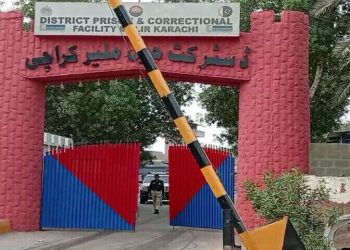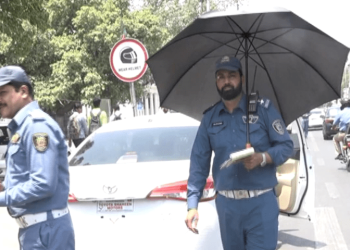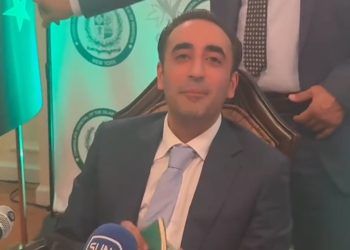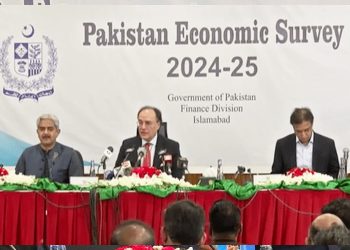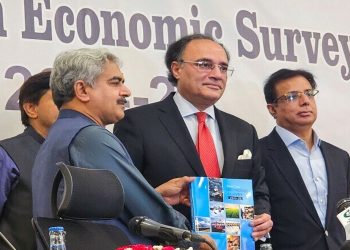ISLAMABAD: Chief Justice of Pakistan (CJP) Umar Ata Bandial on Thursday observed that it was clear that the April 3 ruling of National Assembly Deputy Speaker Qasim Khan Suri to dismiss the no-confidence motion submitted against the prime minister was “wrong”.
He made the remarks as a five-member bench, headed by CJP Bandial and comprising Justice Ijazul Ahsan, Justice Mazhar Alam Miankhel, Justice Munib Akhtar and Justice Mandokhel resumed hearing the suo motu case concerning the legality of the deputy speaker’s ruling and the subsequent dissolution of the NA by the president.
During the hearing, the chief justice remarked that there would be no stability in the country even after the restoration of the National Assembly that had been dissolved as a result of the ruling.
“The real question at hand is what happens next,” he said, adding that now the PML-N counsel and the Attorney General of Pakistan (AGP) Khalid Jawed Khan would guide the court on how to proceed.
The court retired for a 15 minutes break. The CJP said after the break the court will touch upon salient features of the Constitution and would issue a verdict today.
The AGP — who was the last to give his arguments — began by informing the court that he would not be able to give details of the recent meeting of the National Security Committee in an open courtroom.
The Attorney General argued that everyone needed to be loyal to the state. He said that he is not defending the ruling. “However, I think new elections are the only solution,” he added.
He argued that voting on the no-confidence motion was not the fundamental right of a lawmaker. “The right to vote is subject to the Constitution and assembly rules,” Khan said. He also pointed out that if the NA speaker suspends a member, they cannot approach a court against it.
“Are you trying to say that voting on the no confidence motion is subject to the rules,” the CJP asked, to which the AGP replied that all proceedings, including the no-confidence motion, were carried out in accordance with the rules.
At this, Justice Akhtar remarked that the speaker was the caretaker of the house. “The speaker is not there for his personal satisfaction. The speaker can’t just give his opinion and ignore the members,” he observed.
The AGP replied by saying that political parties play an important role in a parliamentary system of government. However, he pointed out that assembly had a term limit, not the members. “One individual has the power to dissolve the assembly.”
‘Speaker can circumvent law to save Pakistan’
At the outset of the hearing, PM Imran’s counsel Imtiaz Siddiqui argued that the scrutiny of parliamentary proceedings was beyond the mandate of the judiciary. “The court should ask parliament to clean up its mess,” he added.
CJ Bandial said the premier left the country in a lurch by announcing snap elections in 90 days and added that, according to the petitioners, the speaker could not have ruled before March 28 before leave was granted for the no-trust motion to be moved.
“What will you say on this,” Justice Bandial asked. The PM’s counsel added that the opposition did not object to the deputy speaker chairing the session. “Qasim Suri used his mind to come on a decision he considered better,” the lawyer said.
CJ Bandial said the court will review to what extent the proceedings were protected under Article 69. The lawyer said if the speaker had knowledge of a foreign-backed regime-change plot or a threat to national security then he could circumvent the law to “save the country”.
The speaker made a “perfect decision in accordance with his oath”, he said, asserting that it was an “internal parliamentary matter”. “If you read Article 69 with Article 127 then you will see that parliamentary proceedings are completely protected,” the lawyer said, adding that the top court could not interfere in parliament.
Justice Munib Akhtar said the court was not bound to follow the decision that was referred to by the counsel. The lawyer said, “With due respect, you are bound to follow the decisions of a seven-member bench.”
PM’s lawyer Siddiqui said the speaker made the National Security Committee meeting the basis of his decision. “Did the speaker have some material to prove conspiracy to reach this decision,” the CJ asked. “Was it based on good faith,” he further asked.
‘Where is constitutional crisis?’
During today’s hearing, Senator Ali Zafar, the president’s counsel, was asked by Justice Miankhel if the prime minister was the people’s representative. The lawyer replied in the affirmative.
Justice Miankhel then inquired if the premier would be protected if the Constitution was violated in parliament. “Is Parliament not the guardian of the Constitution?” he asked. He also questioned how justice would be awarded in case someone is affected due to parliamentary proceedings.
At this, Zafar replied that the Constitution must be protected in accordance with the rules it underlines. He said that in order to protect the Constitution, each and every article had to be kept in mind.
Justice Bandial then asked what would happen when an injustice was carried out against the entire assembly, not just one member.
“Can Parliament interfere if there’s a conflict between judges,” Zafar offered as a counter argument. “The answer is no. The judiciary has to settle the matter. It can’t interfere just like Parliament can’t interfere in judges’ matters.”
The CJP also asked whether the formation of the federal government was an “internal matter” of Parliament. Zafar said that the no-confidence motion and the prime minister’s election fell within the ambit of Parliament. He said that the National Assembly is formed for the purpose of appointing a speaker and a prime minister.
However, Justice Miankhel said that the matter at present concerned the no-confidence motion. “A ruling came after the motion. Address this issue,” he told Zafar. CJP Bandial also said that the verdict he was referring to was related to the oath.
However, Zafar argued that in this case too elections were announced after dissolving the assembly. At one point, the CJP asked Zafar why he wasn’t explaining whether or not there was a constitutional crisis in the country.
“If everything is happening according to the Constitution, where is the crisis?” he asked. Zafar replied that he was also saying the same and there was no constitutional crisis in the country.
The CJP also observed that there seemed to be a violation of Article 95. He noted that holding elections cost the nation “billions of rupees”. However, Zafar argued that the announcement of the election showed there was no malice behind the government’s move.
Justice Ahsan noted that the PTI still held the majority despite the recent defections. “But what if the majority party is ousted from the system?” he wondered. Zafar replied that the president’s counsel couldn’t comment on political matters and ended his arguments.
Suo motu notice
On Sunday, CJP Bandial had taken suo motu notice of the situation after the deputy speaker’s dismissal of the no-confidence motion against the premier, clubbing multiple petitions filed by various parties with it.
After a brief hearing, a written order was issued which said the court would like to “examine whether such an action (dismissal of the no-trust motion on the basis of Article 5) is protected by the ouster (removal from the court’s jurisdiction) contained in Article 69 of the Constitution.”
Article 69 of the Constitution essentially restricts the court’s jurisdiction to exercise authority on a member or officer of parliament with respect to the functions of regulating parliamentary proceedings or conducting business.
“No officer or member of Majlis-i-Shoora (parliament) in whom powers are vested by or under the Constitution for regulating procedure or the conduct of business, or for maintaining order in Majlis-i-Shoora, shall be subject to the jurisdiction of any court in respect of the exercise by him of those powers,” clause two of the Article reads.
The court had also ordered all state functionaries and authorities — as well as political parties — to refrain from taking any advantage of the current situation and stay strictly within the confines of the Constitution.











